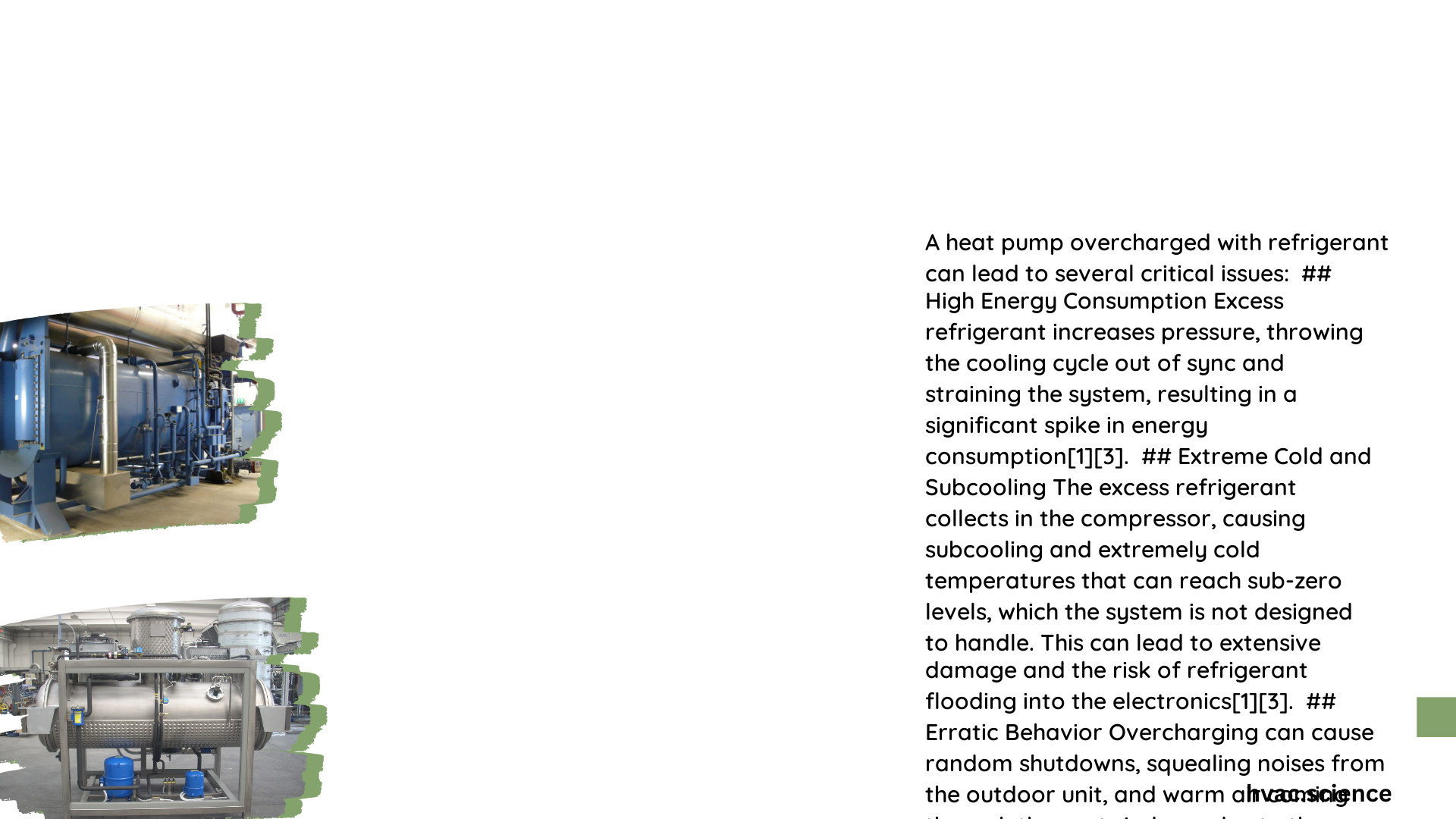A heat pump overcharged with refrigerant can lead to significant performance issues, increased energy consumption, and potential system damage. Overcharging occurs when excessive refrigerant is added to the system, disrupting its delicate balance. This article explores the symptoms of an overcharged heat pump, its causes, effects on system performance, and troubleshooting methods to address the issue effectively.
What Are the Symptoms of an Overcharged Heat Pump?
An overcharged heat pump can exhibit several telltale signs:
- High head pressure
- Low superheat
- High subcooling
- Increased compressor amperage
- Reduced system capacity
- Temperature fluctuations
Let’s delve deeper into these symptoms:
High Head Pressure
An overcharged system often shows abnormally high head pressure. For instance, in a system using R410A refrigerant, the head pressure might exceed 400 psi, which is significantly higher than the normal operating range.
Low Superheat
In fixed metering device systems, low or zero superheat is a key indicator of overcharging. This suggests that liquid refrigerant is present in the suction line, which can be detrimental to the compressor.
High Subcooling
Elevated subcooling numbers indicate that more refrigerant is accumulating in the condenser than necessary. This is a clear sign of system overcharge.
Increased Compressor Amperage
Overcharging can cause the compressor to draw more current due to increased back pressure. This occurs even if the suction pressure and superheat remain relatively stable.
Reduced System Capacity
An overcharged heat pump may experience decreased cooling or heating capacity. This is because excess refrigerant affects the heat exchange efficiency of the coils.
Temperature Fluctuations
The evaporator temperature may rise, reducing the system’s ability to remove heat from the air flowing over the evaporator coil. This can result in a normal to low delta T (temperature difference between supply and return air).
What Causes a Heat Pump to Be Overcharged?

Several factors can lead to an overcharged heat pump:
- Installation errors
- Maintenance oversights
- Incorrect refrigerant types
Let’s examine these causes in detail:
Installation Errors
- Incorrect Line Set Length: Failing to account for additional refrigerant needed for longer line sets can result in overcharging if not properly adjusted.
- Mismatched Components: Using components that don’t match the system’s specifications, such as an oversized coil, may require additional refrigerant and lead to overcharging if not managed correctly.
Maintenance Oversights
- Improper Charging: Adding too much refrigerant during maintenance or not following the manufacturer’s charging chart can result in overcharging.
- Failure to Check System Parameters: Not regularly checking and adjusting system parameters such as superheat, subcooling, and pressure can lead to undetected overcharging issues.
Incorrect Refrigerant Types
While overcharging can occur with any refrigerant type, it’s particularly problematic with modern refrigerants like R410A due to their higher pressures and specific charging requirements.
How Does Overcharging Affect Heat Pump Performance?
Overcharging a heat pump can have several negative impacts on its performance:
- Reduced energy efficiency
- Shortened system lifespan
- Increased risk of mechanical failures
Let’s break down these effects:
Reduced Energy Efficiency
An overcharged system consumes more energy due to higher compressor amperage and reduced system efficiency. This can lead to a significant increase in annual energy costs.
Shortened System Lifespan
Overcharging puts extra strain on the compressor and other components, potentially leading to premature wear and failures. This can significantly reduce the overall lifespan of the heat pump system.
Increased Risk of Mechanical Failures
- Compressor Damage: Low superheat can cause liquid refrigerant to enter the compressor, potentially causing severe damage or complete failure.
- Increased Downtime: Overcharging can lead to more frequent repairs and longer periods of system downtime, as the heat pump may need to be shut down to correct the issue.
How Can You Troubleshoot an Overcharged Heat Pump?
To troubleshoot an overcharged heat pump, follow these steps:
- Gather necessary tools
- Perform measurements
- Analyze results
- Take corrective action
Necessary Tools
To properly diagnose and address an overcharged heat pump, you’ll need:
- Refrigerant charging scales
- Pressure gauges
- Thermometers
- Charging charts from the OEM (Original Equipment Manufacturer)
Measurement Techniques
-
Check Pressure Readings: Measure the high and low side pressures to identify if they are within the recommended range. High head pressure and low superheat are indicative of overcharging.
-
Measure Superheat and Subcooling: Calculate superheat and subcooling using the saturation temperatures and line temperatures. Low superheat and high subcooling suggest overcharging.
-
Check Compressor Amperage: Measure the compressor amperage to see if it’s higher than the rated load amps, indicating increased back pressure due to overcharging.
-
Inspect the System: Look for signs of excessive heat emission from the outdoor unit, unusual noises from the compressor, and frozen coils, which can indicate overcharging.
Analyzing Results
Compare your measurements to the manufacturer’s specifications. For example, a 2.5-ton AC with a 3-ton coil might be stamped with a recommended charge of 4lbs 15oz for R410A. Adjustments should be made based on line set length and other factors.
Corrective Action
If overcharging is confirmed, follow these steps:
-
Drain Excess Refrigerant: Use refrigerant recovery equipment to safely remove excess refrigerant from the system.
-
Recharge to Recommended Levels: Recharge the system according to the manufacturer’s specifications and charging chart, taking into account any adjustments for line set length and other factors.
-
Recheck System Parameters: After adjusting the refrigerant charge, recheck the system parameters to ensure they are within the recommended ranges.
By following these troubleshooting steps, you can effectively diagnose and correct an overcharged heat pump, restoring its efficiency and prolonging its lifespan.
